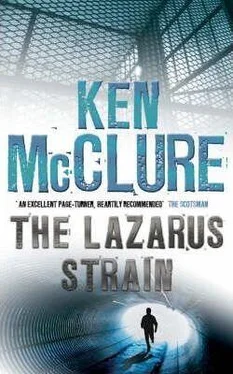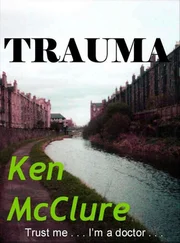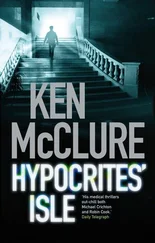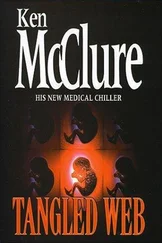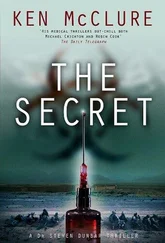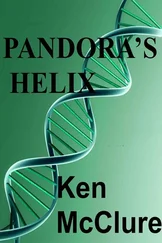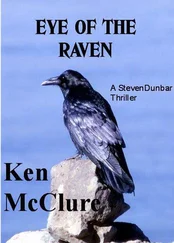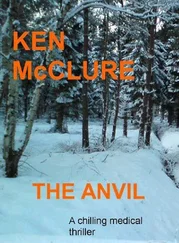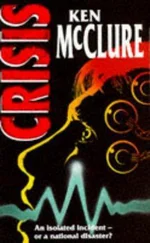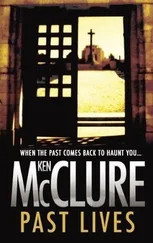He clicked off the CD as he came to the gates of the Auroragen building and wound down the window to show his ID to the white-haired security man who came towards him. The man limped as though he had an arthritic hip and resented being obliged to move it.
‘Visitors car park on the left,’ he snapped. ‘Stay between the white lines. If you want to stay longer than two hours, you’ll need a pass.’
Steven parked the MG between the white lines and walked towards the building pausing briefly at the base of a large abstract sculpture to read the plaque below. He felt sure that it would have a pretentious title and was proved right when he read, ‘The Quality of Mercy’.
‘Shit,’ he murmured. ‘And here was me thinking it was a pile of scrap metal… Sorry, Eduardo.’
He entered the building through smoked glass doors which led to a modern reception area with tiled floors and mosaics of virus particles along the walls. Three young women in corporate navy blue uniform were seated behind the desk, apparently mesmerised by computer screens. He showed his ID to the one who finally looked up and affected an air stewardess smile; he told her that he was expected.
The woman — Melissa from her lapel badge — lifted a blue phone and said into it after a moment’s wait, ‘Dr Dunbar is here.’
‘If you’d like to come with me,’ smiled Melissa, coming out from behind the desk and leading the way to a bank of three lifts. She pressed the button and spoke about the weather while they waited. She concluded with, ‘Still, we’re into February now; it’ll soon be spring.’
Steven smiled and hoped it didn’t look as contrived as it felt. Being ‘into February’ meant that they were now counting down the days to the deadline for Leila’s vaccine strain to be ready.
Steven was shown into a boardroom where he was introduced in turn to five senior executives of the company. The man doing the introductions was a well-preserved man in his sixties who said curtly that he was, ‘John Lamont, in charge of UK operations’.
‘Well, Dr Dunbar, how can we help?’
Steven found it difficult to gauge the mood of those present because of the smiling corporate face being presented. He thought due deference might be the way ahead. ‘Ladies and gentlemen, it would be ridiculous of me to lecture you on the seriousness of our position should we have to face an outbreak of the type of flu that WHO has issued a warning about recently: so I won’t. I am simply here to try and allay some of the fears you have expressed about the new seed strain being prepared and advocated for inclusion in this year’s vaccine schedule. I understand that you are having second thoughts about it and have asked for certain safety conditions to be complied with?’
‘Dr Dunbar,’ said Lamont, pausing to turn a chunky gold pen end over end a few times on the table, ‘when we agreed to government requests that certain procedures be… streamlined, for want of a better word, we did not know that the institute providing the new seed strain would be the Crick. In view of recent events and publicity surrounding that particular establishment, it has to be said that we at Auroragen have become, understandably I think you will agree, nervous. In these circumstances it would be difficult for us to agree to anything other than the full letter of the law being applied to the inclusion of any seed strain for the vaccine.’
‘You mean, you’ll insist on all normal inspections and tests being carried out?’
‘I do.’
‘But the time factor involved in carrying out these tests would automatically preclude the Crick strain from being used.’
‘I fear it would,’ agreed Lamont. ‘Frankly, we are of a mind to use the three strains currently recommended by WHO.’
‘And ignore the threat of an avian strain outbreak?’
‘We are a commercial organisation, Doctor. We are not in the business of taking risks we do not have to take, however laudable the cause. We lost a great deal of money last year through failing to meet inspection and regulation conditions set down by government bodies, we are not about to do the same thing again through failing to implement such standards ourselves.’
Ah, thought Steven, this is what it’s all about, money, and the company was clearly in the driving seat. ‘Frankly, I find that quite understandable,’ he said pleasantly. ‘You really can’t afford to compromise… But supposing government were to perceive the risk of an epidemic as being great enough for them to offer you certain assurances should you agree to the inclusion of the new seed strain…’
‘Then that might be a different matter,’ said Lamont.
‘We would of course, have to know exactly what these assurances were,’ added the woman who had been introduced earlier as Lilian Morrison, the company’s financial controller.
‘Of course,’ said Steven.
‘And I think that these assurances might well have to extend to… guarantees,’ added Lamont.
Well, here we are, thought Steven. That wasn’t too difficult. Auroragen wanted government to shoulder all responsibility for including an untested seed strain in their vaccine and to guarantee that they wouldn’t lose money over it. ‘And if you were to receive such assurances and guarantees…?’
‘We would be happy to comply with government wishes.’
‘Then I feel optimistic,’ said Steven.
The meeting broke up with Steven being asked if he would like to see round the production facilities, an invitation which he readily accepted. The man detailed to do the honours was one of those who had been at the meeting, David Nettles, head of quality control. They had coffee first in his office.
‘Last year must have been a bit of a nightmare for you,’ said Steven.
‘I’ll say,’ said Nettles.
‘What exactly happened?’
‘We’re still not sure to be honest. It seemed to start off as a simple case of bacterial contamination — which happens from time to time in all virus labs — and we responded accordingly and expected that to be an end to the matter and then it broke out again. We carried out a second massive clean-up operation, which we felt sure would see an end to the problem, although we didn’t manage to identify the source of the contamination and blow me, if it didn’t break out again. The regulations of course prevent us treating vaccine to get rid of any contaminating bacteria — even harmless ones — so our license was withdrawn and we had to destroy the lot. Forty-eight million doses down the tubes and no flu vaccine for half the USA.’
‘Did you ever identify the source of the contamination?’
Nettles shook his head.
‘Was it caused by the same organism throughout?’
‘It was. A harmless everyday strain of Serratia, which you find all over the place but which kept getting into our virus cultures whatever we did to stop it. It ended up costing us millions.’
‘Strange,’ said Steven. ‘No sign of it since?’
‘No, touch wood,’ replied Nettles. ‘We stripped out and refitted the entire culture suite. Everything that could be changed was changed — including the staff. We replaced all the lab equipment and implemented strict new aseptic measures whereby staff wear coverall suits and visors all the time — and there’s been no sign of a problem since.’
Steven was shown round the facilities and was greatly impressed by what he saw. He was left with no doubt in his mind that Auroragen was a thoroughly professional organisation being run by an excellent management team. He drove back to Norfolk and phoned in his report to Macmillan.
‘HMG won’t like this,’ said Macmillan, ‘but I don’t see that they have any option. They’ll just have to agree to the conditions.’
Читать дальше
